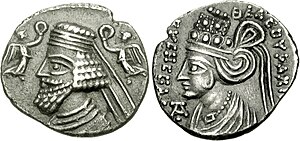Musa (Königin)
aus Wikipedia, der freien Enzyklopädie

Musa (bei Flavius Josephus als Thermusa bezeichnet) war eine parthische Königin. Sie war zunächst die Gattin von Phraates IV. und später die des Phraatakes.
Im Jahr 20 v. Chr. gaben die Römer einen Sohn des Phraates IV. an den Herrscher zurück, der als Geisel gehalten worden war. Die Parther lieferten im Gegenzug von ihnen eroberte Feldzeichen und Gefangene an die Römer aus. Im Gefolge des Sohnes befand sich nun auch eine Sklavin, ebendiese Musa. Musa erlangte am Hof von Phraates IV. den Status einer Geliebten und gebar dem Herrscher einen Sohn: Phraatakes, worauf sie zur Gemahlin von Phraates IV. erhoben wurde.
Im Jahr 10 v. Chr. konnte sie den König überreden, seine vier ältesten Söhne zur Ausbildung nach Rom zu senden. Im Jahr 2 v. Chr. vergiftete sie ihren Gemahl und setzte ihren eigenen Sohn Phraatakes auf den parthischen Thron. Im Jahr 2 heiratete sie diesen sogar und erscheint fortan mit ihm auf seinen Münzen. Im Jahr 4 verschwinden beide von der politischen Bühne. Nach Josephus sind beide wegen ihrer Heirat umgebracht worden.
Musa ist fast nur durch die römische Geschichtsschreibung bekannt, die die Parther – als Hauptfeinde – in einem negativen Licht zeichnen.
Quellen
[Bearbeiten | Quelltext bearbeiten]- Flavius Josephus, Jüdische Altertümer XVIII,2,4.
Literatur
[Bearbeiten | Quelltext bearbeiten]- J. M. Bigwood, Queen Mousa, Mother and Wife (?) of King Phraatakes of Parthia. A Re-evaluation of the Evidence. In: Mouseion Ser. 3, Band 4, 2004, S. 35–70.
- Irene Huber, Udo Hartmann: „Denn ihrem Diktat vermochte der König nicht zu widersprechen …“ Die Position der Frauen am Hof der Arsakiden. In: Antonio Panaino, Andrea Piras (Hrsg.): Proceedings of the 5th Conference of the Societas Iranologica Europæa. Band 1: Ancient and Middle Iranian studies. Mimesis, Mailand 2006, S. 485–517.
- Emma Strugnell: Thea Musa, Roman Queen of Parthia. In: Iranica Antiqua. Band 43, 2008, S. 275–298.
- Duane W. Roller: Cleopatra's daughter and other royal women of the Augustan era. Oxford University Press, Oxford/New York 2018, ISBN 978-0-19-061882-7, S. 123–127.
Weblinks
[Bearbeiten | Quelltext bearbeiten]| Personendaten | |
|---|---|
| NAME | Musa |
| ALTERNATIVNAMEN | Thermusa |
| KURZBESCHREIBUNG | parthische Königin |
| GEBURTSDATUM | 1. Jahrhundert v. Chr. |
| STERBEDATUM | 1. Jahrhundert |
Text is available under the CC BY-SA 4.0 license; additional terms may apply.
Images, videos and audio are available under their respective licenses.
